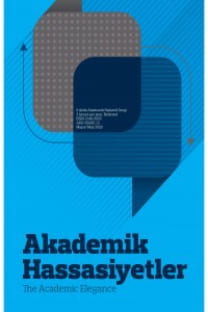KATILIM BANKACILIĞI ÖZELİNDE KOBİ’LERİN FİNANSAL SİSTEME YÖNELİK TUTUM VE ALGILARININ İNCELENMESİ
KOBİ, İslami Finans Sistemi, Katılım Bankacılığı, T-testi, ANOVA
EXAMINATION OF SMES’ ATTITUDES AND PERCEPTIONS REGARDING FINANCIAL SYSTEM SPECIFIC TO PARTICIPATION BANKING
SME, Islamic Finance System, Participation Banking, t-test, ANOVA,
___
- Abdesamed, K. H. ve Abd Wahab, K. (2015). Owner/managers’ External Financing used and Preference towards Islamic Banking. International Journal of Economics and Management Engineering, 9(9), 3257-3262.
- Ajzen, I. (1991). The Theory of Planned Behavior. Organizational Behavior and Human Decision Processes, 50(2), 179-211. 10.1016/07495978(91)90020-T.
- Al Balushi, Y., Locke, S. ve Boulanouar, Z. (2019). Omani SME Perceptions towards Islamic Financing Systems. Qualitative Research in Financial Markets.
- Awang, M. D., Muhammad, J., Noor, M. N. A. M., Abdullah, A., Abdullah, A. A., Abdullah, N., ve Abai, D. S. A. (2020). Knowledge, Acceptance and Application of Islamic Financial Management among Small and Medium Enterprises (SMEs) Halal Entrepreneurs in Peninsular of Malaysia. KnE Social Sciences, 216-226.
- Bouarar, A. C. ve Mouloudj, K. (2020). Examining Awareness Level of Islamic Finance among Customers of Banks in Algeria-Exploratory Study, MPRA Paper, 1-11.
- Gait, A. ve Worthington, A. C. (2009). Libyan Business Firm Attitudes towards Islamic Methods of Finance. Available at SSRN 1370752.
- Gökçen, G. ve Gönen, İ. (2017). Katılım bankalarının finans sektörü içindeki yeri ve katılım bankalarına yönelik müşteri algısı. Finans Ekonomi ve Sosyal Araştırmalar Dergisi, 2(1), 61-77.
- Güllülü, U., Uçan, Ö. F. ve Karabulut T. (2016). Es-Qual Kullanarak, Kitap vatışı Yapan Web-Sitelerin Hizmet Kalitesinin Ölçülmesi ve Bu Hizmet Kalitesinin Algılanan Değer Ve Sadakat Niyeti Üzerine Etkisi: Erzincan Üniversitesi Akademisyenleri Üzerine Bir Araştırma. Atatürk Üniversitesi İktisadi ve İdari Bilimler Dergisi, 30(1).
- Gürbüz, A., Bekereci, N. E. ve Ayrıçay, Y. (2020). Kurumsal Banka Müşterilerin Katılım Bankalarına Yönelik Algıları Üzerine Bir Alan Araştırması. Kahramanmaraş Sütçü İmam Üniversitesi İktisadi ve İdari Bilimler Fakültesi Dergisi, 10(1), 59-81.
- Haron, R. ve Ibrahim, K. (2016). Islamic Financing in Mitigating Access to Financing Problems of SMEs in Malaysia: A Survey Analysis. Intellectual Discourse, 24. Jaffar, M. A. ve Musa, R. (2014). Determinants of Attitude towards Islamic Financing among Halal-Certified Micro and SMEs: A Preliminary Investigation. Procedia-Social and Behavioral Sciences, 130, 135-144.
- Karagöz, Y. (2019). SPSS AMOS META Uygulamalı İstatistiksel Analizler, Ankara.
- Kettell, B. (2011). Introduction to Islamic banking and finance (Vol. 551). John Wiley & Sons.
- Kocabıyık, T. ve Teker, T. (2019). KOBİ'lerin Katılım Bankalarına Bakışı: Isparta İlinde Bir Uygulama, 1. Third Sector Social Economic Review, 54(4), 2010-2024.
- Muhmad, S. N., Wan Ismail, W. N. S., A Rahim, N. A. A. ve Ahmad, S. N. (2020). Islamic Financing for Small Medium Enterprises: Challenges and opportunities. Global Business Management Review, 12(2), 50-64.
- Muneer, S., Ali, A. ve Ahmad, R. A. (2017). Impact of Financing on Small and Medium Enterprises (SMEs) Profitability with Moderating Role of Islamic Finance. Information Management and Business Review, 9(2), 25-32.
- Olsen, S. E. (2020). 2020 Survey of Smes and Consumers in Us Having a Propensity to Transact Business Using Islamic Financing as an Alternative Financing Mechanism (Doctoral dissertation, Northcentral University).
- Özen, E., Şenyıldız, L. ve Akarbulut, K. (2016). Faizsiz bankacılık algısı: Uşak ili örneği. Journal of Accounting Finance and Auditing Studies, 2(4), 1-19.
- Rasheed, R. ve Abdul Rahman, M. (2017). Influence of Awareness on SME’s Intention towards Islamic Finance Adoption in Pakistan.
- Saracel, N., Özkara, B., Karakaş, M., Özdemir, Ş., Yelken, R., Dündar, S. ve Karaca, Y. (2002), “Afyon İli Tüketim Analizi, Tüketici Davranışları ve Eğilimleri”. Afyon Kocatepe Üniversitesi Yayınları, Cilt:27, ss.28.
- Tavşancıl, E. (2010). Tutumların ölçülmesi ve SPSS ile veri analizi. Ankara: Nobel.
- TKKB, https://tkbb.org.tr/ (Erişim Tarihi: 10.11.2021).
- TÜİK, https://www.tuik.gov.tr/ (Erişim Tarihi: 13.11.2021).
- Toraman, C., Ata, H. A. ve Buğan, M. F. (2015). İslami Bankacılık Faaliyetlerine Yönelik Müşteri Algısı Üzerine Bir Araştırma. Gaziantep University Journal of Social Sciences, 14(4).
- Warde, I. (2000). Islamic finance in the global economy. Edinburgh University Press.
- Yılmaz, T., Ekinci, S. ve Önk, K. (2018). KOBİ’lerin Katılım (İslami-Faizsiz) Bankalarının Faaliyetlerine Yönelik Tutumlarının Tespit Edilmesine Yönelik Bir Araştırma, International Journal of Academic Value Studies, 4(18), 54-69.
- Ziky, M. ve Daouah, R. (2019). Exploring Small and Medium Enterprises’ Perceptions Towards Islamic Banking Products in Morocco. International Journal of Economics and Finance, 11(10), 106-117.
- ISSN: 2148-5933
- Yayın Aralığı: Yılda 3 Sayı
- Başlangıç: 2014
- Yayıncı: A Kitap
TÜRKİYE’NİN TOPLUMSAL ATMOSFERİNİN SİNEMASAL ÖRNEĞİ: ZEKİ ÖKTEN SİNEMASINDA TOPLUMSAL GERÇEKÇİLİK
COVID-19’UN KÜRESEL İSLAMİ VE GELENEKSEL ENDEKSLER ÜZERİNDEKİ OYNAKLIK ETKİLERİ
Süleyman AÇIKALIN, İlker SAKINÇ
MİLLİYETÇİ SÖYLEMDE “YERLİ VE MİLLİ”LİK: KUTLU SESLENİŞ DERGİSİ ÖRNEĞİ
OBJET PETİT A TEORİSİNE GÖRE “MEHLİKA SULTAN”
TÜRKİYE’DE İŞÇİ SENDİKALARINDA TOPLU PAZARLIK STRATEJİLERİ
GIDA PERAKANDE SEKTÖRÜNDE SON TÜKETİM TARİHİNE İLİŞKİN MÜŞTERİ ŞİKAYETLERİNİN İNCELENMESİ
Volkan TEMİZKAN, Muhammet Ali YETGİN
KRİPTO PARALARIN MUHASEBELEŞTİRİLMESİ HUSUSUNDA UYGULAMALAR, ALTERNATİF YAKLAŞIMLAR VE ÖNERİLER
İŞ MOTİVASYONU-ÖRGÜTSEL BAĞLILIK İLİŞKİSİ: BİR ALAN ARAŞTIRMASI
Edip ÖRÜCÜ, Mehmet TOKYAY, Itır HASIRCI
KATILIM BANKACILIĞI ÖZELİNDE KOBİ’LERİN FİNANSAL SİSTEME YÖNELİK TUTUM VE ALGILARININ İNCELENMESİ
